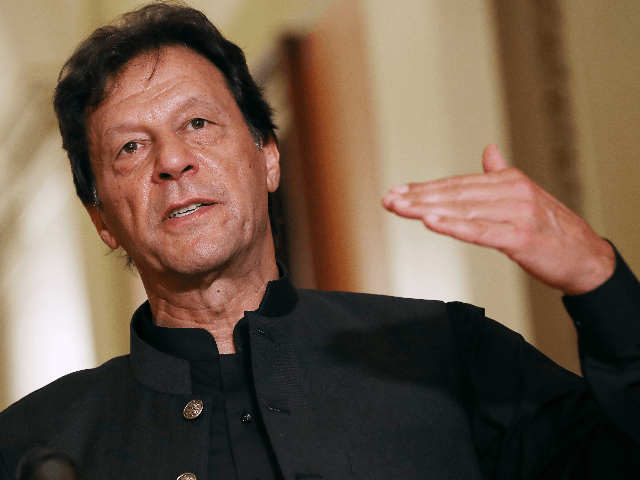Prime Minister Imran Khan of Pakistan, an Islamist who has spearheaded a campaign demanding global laws against blasphemy, said in a recent interview that President Donald Trump is placing “extraordinary” pressure on his country to recognize the state of Israel.
Middle East Eye noted on Monday that Khan also suggested other states, which he did not name, were adding to the pressure to accept that Israel is a country and formalize diplomatic relations. Khan, who has made anti-semitic comments about the “Jewish lobby” controlling “global media” in the past, insisted that he would not negotiate with “Zionists” unless Palestinians managed to establish a sovereign state for themselves.
Trump has spearheaded efforts to normalize relations between Israel and Muslim states, most of which do not recognize Israel formally and claim that its existence is a violation of the rights of Palestinians. This fall, the United Arab Emirates, Bahrain, and Sudan all normalized relations with Israel, thanking American diplomatic efforts for the breakthrough. Prior to that, only two Arab states, Egypt and Jordan, recognized Israel as a legitimate state. Trump at the time suggested that other states may soon join the most recent three, hinting that even Saudi Arabia, home to the holiest sites in Islam, may consider a peace deal.
The interview with Khan reportedly occurred on a Pakistani local broadcaster last week.
“The pressure is because of Israel’s deep impact [influence] in the U.S. This [influence] was in fact extraordinary during the Trump’s stint,” Khan reportedly told the outlet, according to Pakistan’s Express Tribune. He said other nations were also pressuring Pakistan to establish peace with Israel, but did not name them because “we have good relations with them.” He did not dismiss the possibility that the other nations were also Muslim countries, suggesting that some may have been those recently establishing ties to Israel.
Khan indicated that neither the United States nor any other nation had made any progress in convincing the Islamist leader that peace with Israel would be beneficial to his country.
“I have no second thought to recognize Israel unless there is a just settlement, which satisfies Palestinians,” he reportedly asserted.
Khan also answered questions regarding how he expected his relationship would be with Democrat presidential challenger Joe Biden if he is to be inaugurated president in January. He expressed no optimism in a change in direction from the White House.
“I am not sure about Biden’s policy on Israel, Iran, and Kashmir but I am sure there will be no change in [Washington’s] Afghan policy. The Democrats too want to pull out of Afghanistan,” Khan was quoted as saying. “Afghanistan is not the real issue. The real issue is Israel. It is to be seen how he [Biden] deals with that. Whether he changes Trump’s policies [about Israel] or continues with them.”
Normalization of relations with Israel would likely be extremely unpopular in Pakistan, an explicitly Islamist country where Muslim mobs regularly lynch Christians and Hindus for alleged “blasphemy” against their faith. Khan — who radical Islamists have accused of being secretly Jewish over his failed marriage to a Muslim convert from a Jewish family — finds himself regularly negotiating with radical Islamic groups to prevent outbreaks of violence. On Monday, Khan’s government managed to convince Tehreek-e-Labbaik Pakistan (TLP) to stop a rally that began on Sunday but extended deep into Monday demanding a boycott of France and diplomatic retribution against French President Emmanuel Macron for opposing the beheading of a schoolteacher. Pakistani officials deployed thousands of police officers to the capital and used storage containers to block off most entries to the capital, expecting mob violence.
Khan has thus never expressed any interest in diplomatic relations with Israel. In September, when news broke of the UAE and Bahrain peace deals, Khan called normalizing relations with Israel “pointless.”
“We can’t make a decision on a matter that has been rejected by its owners, the Palestinian people,” Khan said. “The Palestinians, the owners of the cause, were deprived from their lands and rights.”
A month prior, Khan suggested that the reason Pakistan could not find peace with Israel is that he feared that doing so would require Pakistan to recognize Indian sovereignty over the disputed region of Kashmir.
“When you talk of Israel and Palestine, we need to think, will we be able to answer [God] if we abandon those people who have faced every kind of injustice and whose rights were taken away? My own conscience will never allow me to do this, I can never accept it,” Khan said at the time, adding that if Pakistan made peace with Israel, “we will have to give up Kashmir as well then.”
Under Khan, Pakistan won a seat on the 2021 United Nations Human Rights Council, which regularly receives global criticism for leveraging its influence to condemn Israel while failing to address major human rights crises in member nations. Venezuela is currently a member of the Human Rights Council; China, Cuba, and Uzbekistan, among others, are slated to join next year. The United States withdrew from the Council under Trump to protest its attacks on Israel and its inaction elsewhere.
Khan’s officials vowed to use their voice on the Council to fight “Islamophobia.” In September, Khan told the United Nations General Assembly that the world had an urgent need for enforceable laws against free speech that may offend Muslims.
“We stress that willful provocations and incitement to hate and violence must be universally outlawed,” Khan said at the virtual assembly. “This Assembly should declare an ‘International Day to Combat Islamophobia’ and build a resilient coalition to fight this scourge — scourge that splits humanity.”
“Blasphemy in the garb of freedom of expression is intolerable,” Khan reiterated in November.

COMMENTS
Please let us know if you're having issues with commenting.